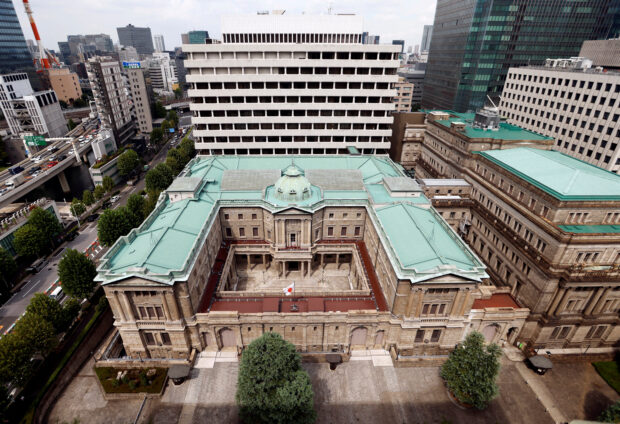Japan on cusp of ending its negative interest rates experiment

Japanese national flag is hoisted atop the headquarters of Bank of Japan in Tokyo, Japan Sept 20, 2023. REUTERS/Issei Kato/File photo
TOKYO — The Bank of Japan is close to ending eight years of negative interest rate policy, with expected historical wage hikes heightening the prospect of a landmark shift away from its massive stimulus program next week.
Internal preparations for an exit have been in the works since Kazuo Ueda took office as BOJ governor in April last year, and were mostly done by year-end, say sources familiar with the bank’s thinking.
BOJ officials, including Ueda, have recently stressed the timing of a shift away from negative rates would depend on the outcome of this year’s annual wage negotiations between workers and employers.
The bumper pay hikes offered by big firms like Toyota Motor this month, the biggest in 25 years, are now seen clearing the way for the BOJ to phase out its massive stimulus.
READ: Japan sees growing momentum towards March end to negative rate
If the board believes the conditions are right, the BOJ will set the overnight call rate as its new target and guide it in a range of 0-0.1% by paying 0.1% interest to excess reserves financial institutions park with the central bank.
BOJ decision seen next week
The BOJ will likely make a final decision on whether to pull the trigger next week, or hold off until April, after scrutinising a preliminary survey of big firms’ wage talk outcome to be released by labour umbrella Rengo later on Friday.
“If big firms are offering big pay hikes, it’s highly likely that smaller firms will follow suit to some extent so they can hire enough staff,” said Yoshiki Shinke, senior executive economist at Dai-ichi Life Research Institute.
“Rengo’s survey due out on Friday will give the BOJ a big reason to end negative rates in March,” he said.
Analysts expect Friday’s Rengo survey to show wage increase of around 4.5 percent or even 5 percent far above the 3.8 percent hike in a poll conducted a year ago, heightening hopes that rising pay will revive stagnant household spending and broader economic growth.
READ: Japanese firms offer biggest pay rise since 2013, union says
Upon exiting its negative rate policy, the BOJ will also ditch its bond yield control and discontinue purchases of risky assets such as exchange-traded funds (ETF), sources have told Reuters, putting a formal end to the radical monetary experiment of former Governor Haruhiko Kuroda in place since 2013.
A poll taken in March showed 35 percent of economists expect the BOJ to end negative rates at the two-day meeting ending on Tuesday, up from the previous month’s 7 percent but still below 62 percent projecting such action at a subsequent meeting on April 25-26.
Pace of rate hikes
With an end to negative rates seen as nearly a done deal, the market’s attention is shifting to any clues the BOJ could give on the pace of any interest rate hikes thereafter.
READ: OECD urges Japan’s central bank to gradually raise interest rates
Ueda has said the central bank will maintain accommodative monetary conditions even after ending negative rates, and avoid causing any “discontinuity” from the current ultra-loose policy given uncertainty over the economic outlook.
Any guidance on the future policy path that the BOJ could offer upon ending negative rates will likely be in line with such comments, sources have told Reuters.
Under previous governor Kuroda, the BOJ deployed a huge asset-buying program in 2013 to reflate growth and fire up inflation to its 2 percent inflation in roughly two years.
The central bank introduced negative rates and yield curve control (YCC) in 2016 as tepid inflation forced it to tweak its stimulus program to a more sustainable one.
However, last year, as the yen’s sharp falls pushed up the cost of imports and heightened public criticism over the cost of Japan’s ultra-low interest rates, the BOJ tweaked YCC to relax its grip on long-term rates.
An end to negative short-term rates would be Japan’s first interest rate hike since 2007.